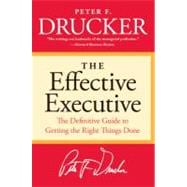What makes an effective executive?
The measure of the executive, Peter F. Drucker reminds us, is the ability to "get the right things done." This usually involves doing what other people have overlooked as well as avoiding what is unproductive. Intelligence, imagination, and knowledge may all be wasted in an executive job without the acquired habits of mind that mold them into results.
Drucker identifies five practices essential to business effectiveness that can, and must, be learned:
-Managing time
-Choosing what to contribute to the organization
-Knowing where and how to mobilize strength for best effect
-Setting the right priorities
-Knitting all of them together with effective decision-making
Ranging widely through the annals of business and government, Peter F. Drucker demonstrates the distinctive skill of the executive and offers fresh insights into old and seemingly obvious business situations.
‘’Long recognised in business circles as a voice to listen to’’ -Harvard Business Review
‘’...it would be difficult to overestimate his contribution to management thinking’’- Financial Times








